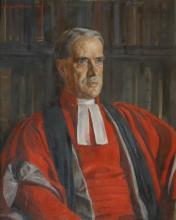Charles Earle Raven was born on 4 July 1885 in Paddington, London, to John Earle Raven, barrister, and Alice (née Comber). Educated at Uppingham School, Raven went up to Cambridge with a classical scholarship, and specialised in early Christian doctrine. He became engaged to Margaret Ermyntrude Buchanan Wollaston in 1906 and they married in 1910. The couple had a son and three daughters.
After Cambridge, Raven was Assistant Secretary for Secondary Education under the Liverpool City Council (1908–1909), when he worked with a large boys’ club. The social inequality he saw through the boys awakened his interest in Christian Socialism. In December 1909 Raven was ordained, as a precondition to his appointment as Lecturer in Divinity, Fellow and Dean of Emmanuel College, Cambridge. During the First World War Raven was assistant master at Tonbridge School (1915–1917), and volunteered for service abroad as a front-line army chaplain in France (1917–1918).
After the war Raven returned to Emmanuel, before accepting the college living of Bletchingley, Surrey (1920–1924), where he was rector for four years. Renowned for his oratory, Raven was also appointed a chaplain to the King in 1920, and was residentiary canon of the new Liverpool Cathedral from 1924 to 1932. He devoted his time as canon to building up an informal evening service in the Cathedral, and succeeded in bringing together not only large congregations but in creating a real sense of fellowship. During these years, Raven’s earlier interest in Christian Socialism found its practical expression when he was one of the chief organizers of the influential Conference on Christian Politics, Economics and Citizenship (Copec) in 1924, and was its joint secretary from 1920 to 1928.
Among the titles published by Raven in this period (1920–1932) were Christian Socialism, 1848–1854 (1920), the first to treat this Victorian movement historically, and Apollinarianism (1923), an important study of a then-neglected aspect of primitive Christian thought which gained Raven a Cambridge DD. Together they established Raven’s academic credentials, and in 1932 he was elected to the Regius Chair of Divinity at Cambridge. The election came as a surprise even to Raven’s friends, because he was not considered the ‘safe’ type for theological professorships. With the chair, Raven also held a canonry at Ely Cathedral (1932–1940), a fellowship at Christ’s College and the mastership of Christ’s from 1939 to 1950.
An interesting and arresting speaker, Raven would lecture extempore with great energy; treating the great Christian themes in turn—God, Christ, Holy Spirit, creation, creed, future life, ecclesiology, giving special attention to historical thinkers who have tried to synthesise their faith with the reason and science of their times (like the third-century Alexandrian fathers and the seventeenth-century Cambridge Platonists). From boyhood Raven cultivated a life-long love of nature, birds, insects and wildflowers, and had written three books on ornithology. ‘Science’ came to mean predominately biology and evolution to Raven. The relationship of science and religion was the one theme he had lectured and written on more than any other subjects. The Gifford Lectures at Edinburgh (1951–1952), published as Natural Religion and Christian Theology (1953) represented Raven’s most ambitious efforts in this respect, while John Ray, Naturalist (1942), and English Naturalists from Neckam to Ray (1947) are notable studies in the history of biology.
During the Second World War Raven’s association with the pacifist cause brought him a certain amount of isolation and unpopularity, but he worked hard to allay bitterness and to preserve the deeper unity of Christians, whatever position they might be led by conscience to take. He had delivered an impressive apologia in 1934, later published as Is War Obsolete? (1935).
Raven was vice-chancellor of the University of Cambridge (1947–1949) and presided over the admission of women to full membership of the university, a befitting honour for one who had long contended for the advancement of women. He was warden of Madingley Hall, Cambridge (1950–1954). In his retirement, he travelled, lectured and preached widely; visited the United States, Canada, Australia, Russia and India in his speaking engagements; developed a special ministry to six-form boys, and gave a new dimension to religious broadcasting on television and radio.
Raven’s first wife died in 1944. He married Ethel, widows of John Moors of Boston, Massachusetts, in 1954, who died within a fortnight of the marriage. In 1956 Raven married Hélène Jeanty, a former Belgian resistance worker, and the couple lived in Cambridge and Brussels. Raven died in his Cambridge home on 8 July 1964.
Other works by Raven include What Think Ye of Christ? (1916), In Praise of Birds (1925), Our Salvation (1925), The Creator Spirit (1927), autobiography A Wanderer’s Way (1928), Musings and Memories (1931), Jesus and the Gospel of Love (1931), Evolution and the Christian Conception of God (1936), War and the Christian (1939), Science, Religion and the Future (1943) and Good News of God (1943).



